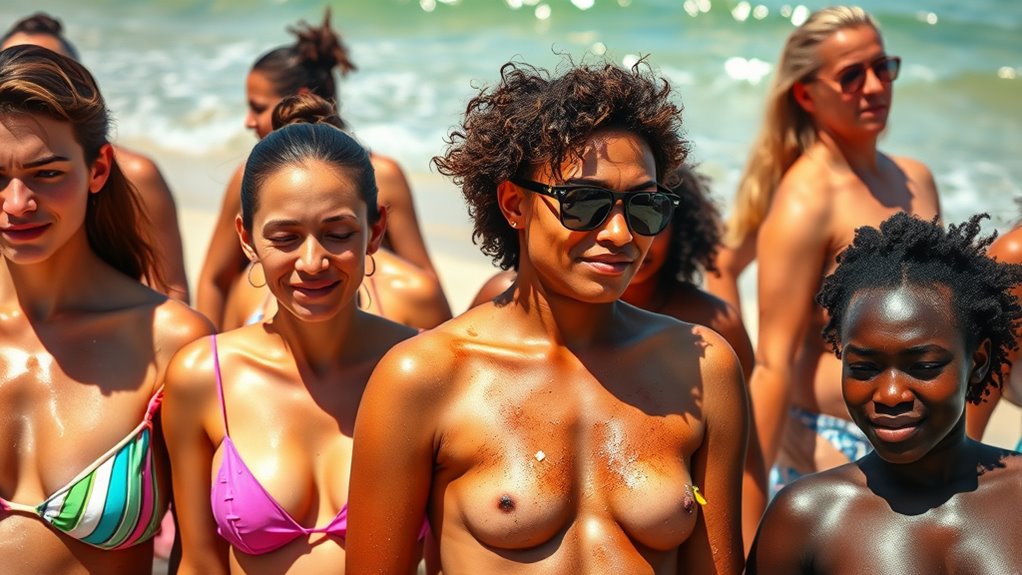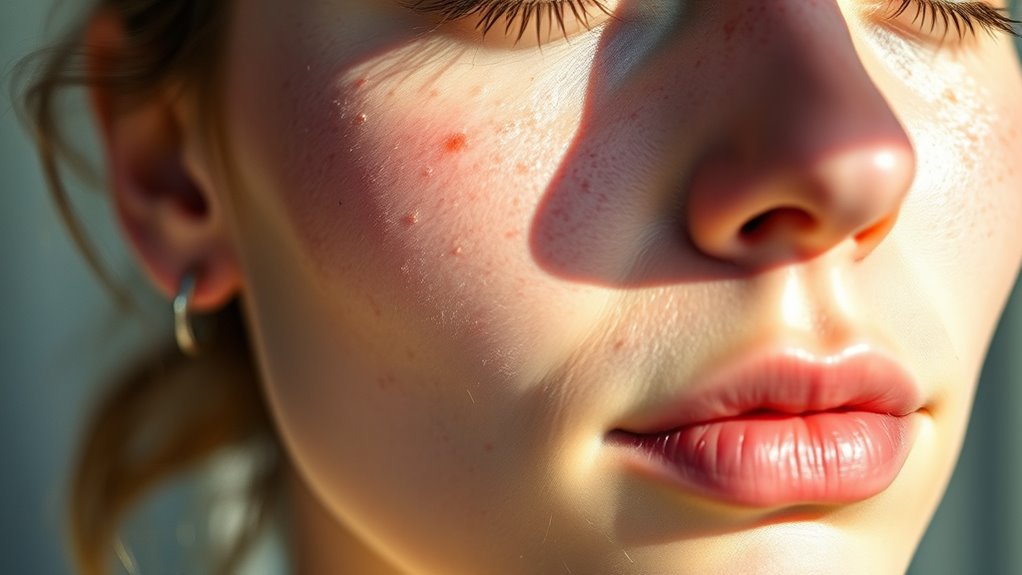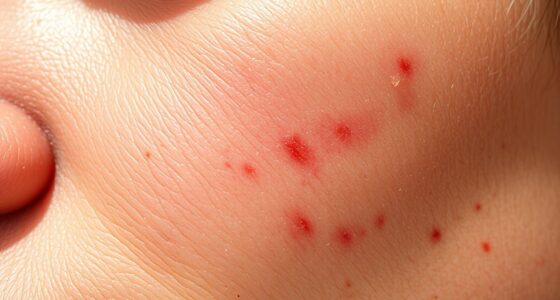Your skin’s tendency to burn or tan is mainly shaped by your genetics, which control how your body responds to UV rays. If you’re less able to produce melanin, you’ll likely burn easily and won’t tan much, as your natural resistance limits melanin production. This isn’t a flaw—it’s a protective trait. Understanding your skin’s genetic response can help you manage sun exposure better. Keep exploring to learn more about what influences your skin’s unique reactions.
Key Takeaways
- Genetic differences influence skin’s ability to produce melanin, affecting whether someone tans or burns.
- High UV resistance genes limit melanin synthesis, leading to less tanning despite sun exposure.
- Some individuals naturally have skin that resists pigmentation changes, making them less likely to tan.
- Lack of tanning is a protective trait, reducing skin damage risk but not eliminating the need for sun protection.
- Understanding genetic skin responses helps in managing sun exposure and preventing skin damage.

Some people just can’t seem to develop a tan, no matter how much time they spend in the sun. This isn’t about laziness or neglect; it’s often rooted in their biology. Your skin’s ability to tan depends heavily on UV resistance, which varies from person to person due to genetic predisposition. When you’re exposed to sunlight, ultraviolet rays trigger your skin to produce melanin, the pigment responsible for tanning. But if your skin naturally resists UV damage, it might not produce enough melanin to create a noticeable tan. That’s because your genetic makeup determines how your skin reacts to UV exposure, influencing everything from melanin production to cell repair mechanisms.
Genetics shape your skin’s response to UV rays, affecting your ability to tan or burn naturally.
If you have a high UV resistance, your skin may be less likely to respond to sun exposure with a tan. Instead, you might notice that your skin burns easily or remains unchanged despite prolonged periods in the sun. This is because your body’s natural defense is to prevent UV rays from penetrating deeply, reducing the stimulus for melanin production. In contrast, people with lower UV resistance tend to tan more readily but are also more susceptible to sunburns and skin damage. Your genetic predisposition plays a key role here—certain genes influence the activity of enzymes involved in melanin synthesis, and variations in these genes determine whether your skin will tan or burn.
Understanding your genetic predisposition can help you better manage sun exposure. If your skin has a high UV resistance, you might think you can spend hours in the sun without consequence, but that’s not always safe. Even if you don’t tan easily, UV rays can still damage your skin over time, increasing the risk of premature aging and skin cancer. That’s why using sun protection measures like broad-spectrum sunscreen, wearing protective clothing, and avoiding peak sunlight hours are essential, regardless of how your skin responds to sun exposure. Additionally, recent research highlights that melanin synthesis is a complex process influenced by multiple genes, which further explains why some people are naturally less predisposed to tanning.
In essence, your ability to tan—or not—is largely pre-programmed by your genetics. Some people are born with a skin type that resists UV-induced pigmentation, making tanning a challenge. This isn’t a flaw; it’s simply a reflection of your unique genetic makeup. Recognizing your skin’s natural responses allows you to take better care of it, ensuring you enjoy the sun safely without risking unnecessary damage. So, if you find yourself unable to develop a tan despite trying, remember it’s your body’s way of protecting you based on your innate UV resistance.
Frequently Asked Questions
Can Sun Exposure Improve Skin Health in Non-Tanners?
Sun exposure can boost your vitamin D levels, which benefits your skin health, but it’s essential to practice sun protection. Non-tanners, who don’t develop a tan, might need less sun to get enough vitamin D, yet overexposure increases skin damage risk. Balance is key—spend limited time in the sun, use protection, and consider supplements if needed. Proper sun practices help improve skin health without risking burns or long-term damage.
How Do Genetic Factors Influence Tanning Ability?
Did you know that about 80% of your ability to tan depends on genetic predispositions? Your genes influence how much melanin your skin produces, directly affecting your tanning ability. If you have lower melanin production, you might struggle to develop a tan, no matter how much sun you get. So, your genetics play a pivotal role in how your skin responds to UV exposure, shaping your natural tanning potential.
Are There Risks Associated With Trying to Tan Artificially?
Trying to tan artificially involves risks you should consider. UV exposure from tanning beds can damage your skin, increasing the risk of skin cancer and premature aging. Your skin pigmentation, which varies among individuals, affects how your skin reacts to UV rays; those with lighter pigmentation are more vulnerable to damage. It’s safer to seek alternatives like self-tanning products, but always remember that any UV exposure carries potential health risks.
Does Skin Type Change Over a Person’S Lifetime?
Did you know skin pigmentation can change over your lifetime? As you age, aging effects can cause your skin to become lighter or darker, depending on genetics and environmental exposure. While some changes are natural, your skin type may also shift due to sun damage or health conditions. So, yes, your skin type can evolve over time, affecting how you respond to sun or artificial tanning.
Can Diet Impact a Person’S Ability to Tan?
Your diet can influence your ability to tan by affecting melanin production. Consuming foods rich in Vitamin D, like fatty fish and fortified products, supports healthy skin and may enhance your natural tanning ability. While diet alone won’t drastically change how you tan, it helps maintain your skin’s overall health and can aid in the melanin production process, making your skin better prepared to develop a tan when exposed to sunlight.
Conclusion
So, next time you wonder why some people never seem to tan, remember it’s all in their genes. The science behind it is complex, and there’s still so much to uncover. Will future research reveal more about these genetic secrets? Or will we discover new ways to change our skin’s response? One thing’s certain—this mystery isn’t solved yet. And as scientists dig deeper, you can bet the story will only get more intriguing.








